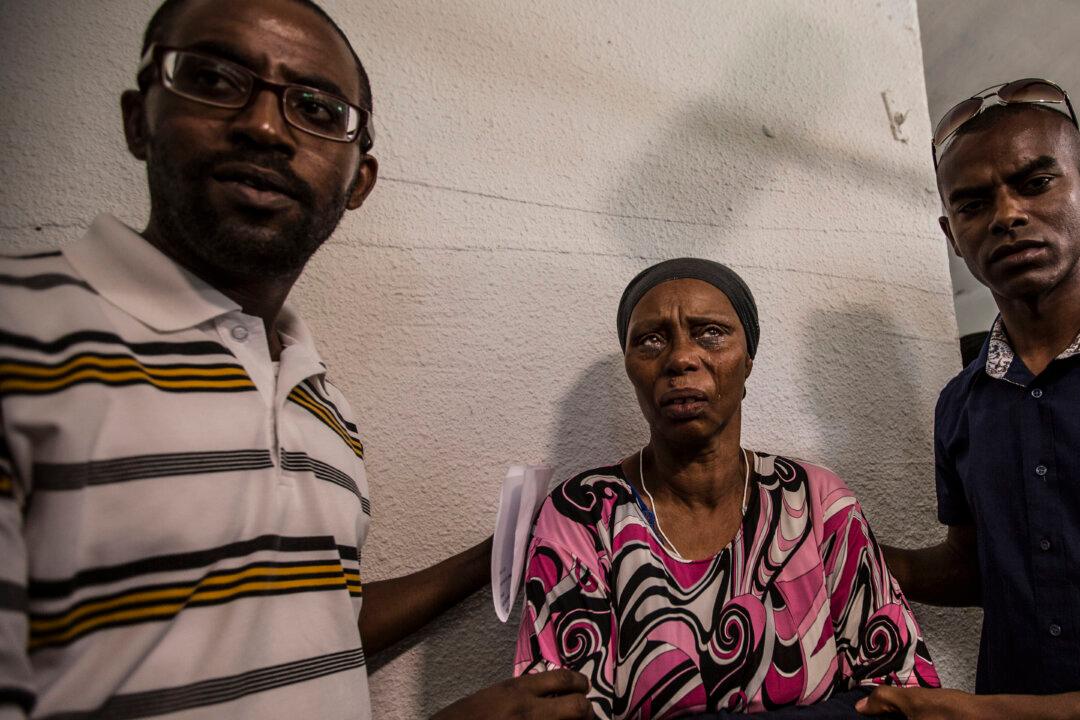JERUSALEM— Two Israeli citizens are being held in the Gaza Strip, at least one of them by the Hamas militant group, Israeli authorities said Thursday.
The announcement, made after months of secrecy, raised memories of the case of Gilad Schalit, an Israeli soldier captured by Hamas in a cross-border raid and released five years later in a prisoner swap, or the deadly kidnappings of three Israeli teens by Hamas militants in the West Bank last summer.
But Thursday’s news was not accompanied by the nationwide panic that occurred with the previous two cases — perhaps because the two missing Israelis were not violently captured but also a reflection of a tense but quiet working relationship that has emerged between Israel and Hamas since a devastating war a year ago.
Avraham Mangisto, an Israeli of Ethiopian descent in his late 20s, “independently” crossed the border fence into the Gaza Strip on Sept. 7 last year, nearly two weeks after the end of the Israel-Gaza war, said the Israeli defense body responsible for Palestinian civilian affairs. It gave no further details of why he crossed into the Palestinian territory.
The Coordinator of Government Activities in the Territories said the second Israeli citizen being held in Gaza is a Bedouin Arab man from Israel’s Negev desert. Officials refused to say how long he has been held in Gaza or how he got there. They also would not say which group had him in custody.
Bedouin make up a small group within Israel’s Arab minority, numbering about 180,000.
COGAT said that “according to credible intelligence,” Mangisto is being held “against his will” by Hamas. It said “Israel has appealed (to) international and regional interlocutors to demand his immediate release and verify his well-being.”
“This is a humanitarian matter and I expect those holding him to treat him properly and to return him in full health,” Israeli President Reuven Rivlin in a statement.
A spokesman for Hamas, Salah Bardawil, declined comment. “We don’t have any information about it. Even if is true, we don’t have instructions to talk about it,” he said.
It was not clear why Israel decided to come forward with the news on Thursday. But Khaled Mashaal, the head of Hamas’ political bureau, may have forced its hand by telling the London-based Al-Araby Al-Jadeed newspaper late Tuesday that Israel had asked Hamas through a European mediator to release “two soldiers and two bodies.”
Israeli media report that the bodies of Israeli soldiers Oron Shaul and Hadar Goldin, killed during combat in Gaza last summer, are thought to be held by Hamas.
Mashaal said Hamas told the mediator that it would not hold negotiations with the “prisoners” Hamas has, nor would it release information about them or their condition, until Israel releases Palestinian prisoners rearrested after being freed in a 2011 high-profile prisoner swap, in which Israel released more than 1,000 Palestinian prisoners in exchange for captive Israeli soldier Schalit.
Israel’s military lifted a gag order Thursday to reveal details of the two Israelis currently being held in Gaza. Senior Israeli government officials, speaking on condition of anonymity because they were unauthorized to speak publicly about the issue, said Israel had hoped keeping the affair quiet could lead to the men’s release.
Israeli media said Israel had turned to international channels to appeal for Mangisto’s release on humanitarian grounds because he was a civilian, not a soldier.
Israeli Channel 2 TV said Mengisto arrived at an Israeli beach on the Gaza border the evening of Sept. 7, left behind his bag and crossed into Gaza through a breach in the border fence apparently left from movement of Israeli tanks during the Israel-Gaza war.
The 50-day war last summer between the Islamic militant Hamas group and Israel left 2,200 Palestinians and 73 people in Israel dead.
Israel and Hamas, an Islamic group sworn to Israel’s destruction, are bitter enemies. But both sides have largely honored a cease-fire that ended last year’s war — their third since Hamas seized control of Gaza in 2007. While they have no formal relations, both sides have worked to keep things quiet, in part to avoid another flare-up in fighting and also in recognition of a rising threat posed by extremist Salafist groups that draw inspiration from the Islamic State group.
Prime Minister Benjamin Netanyahu had been in touch with Mengisto’s parents and Lior Lotan, a retired Israeli army colonel, was handling negotiations to return Mengisto to Israel, Channel 2 TV reported.
“This is a difficult humanitarian matter, because my brother is not in the best of health,” said Ilan Mangisto to reporters. He called on Hamas to free him immediately, and asked Israel and the international community to exert pressure to lead to his release.
He did not elaborate on Mangisto’s health, but Israeli Channel 2 TV said Mangisto was depressed following the death of his brother.
Israeli Channel 10 broadcast an interview with a man it identified as Mengisto’s father, holding up a statement critical of Israeli authorities.
“They didn’t do anything,” Haili Mangisto said. “Where is my son?”
Itamar Shimoni, the mayor of Ashkelon where Avraham Mangisto is from, praised the family of five brothers and said local officials were supporting them.
“The family has been hurting for several months now. They are showing restraint. This is not a family that will go out demonstrating,” he said. “It’s not easy, it’s not easy.”





